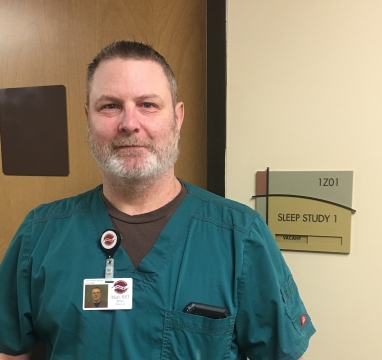If your sleep patterns are negatively impacting your life it may be time to see your medical provider for a referral for a sleep study at Phelps Memorial Health Center.
A sleep study, or polysomnogram, is performed to diagnose sleep disorders such as sleep apnea, insomnia, and restless leg syndrome.
At Phelps Memorial, the study involves spending the night at a sleep study room within the hospital. As you sleep, electrodes attached to your head and body monitor your brain waves, heart beat, eye movements, muscle tension, leg movements, breathing, and blood oxygen levels.
Matt Govier, RPSGT, observes and monitors patients via a camera from a nearby room. As a Registered Polysomnography Technician at Phelps Memorial for the past 15 years, Mr. Govier stated some patients’ biggest worries are that the study is in a hospital and they don’t know what to expect.
“The most common purpose of a sleep study is to diagnose sleep-related breathing disorders. Some may be surprised, but we test approximately three patients a week,” said Mr. Govier.
Because self-reports don't paint a reliable picture about one's sleep, the test is necessary to get a more complete picture about the quality of your rest and what may be going on in your body to affect it. During sleep, the body functions differently than while awake. Disrupted sleep can disturb daytime activities, and while sleeping, some medical problems you may have can cause a risk to your overall health.
“The record of the patient’s sleep test will probably be about 900 pages long, and it will be scored and then interpreted by a physician, said Mr. Govier. He added, “The information then will be used to give a diagnosis and recommended treatment.”
Often patients referred for a sleep study have obstructive sleep apnea. Sleep apnea causes breathing to stop briefly during sleep, pulling the sleeper out of deep sleep. This can happen many times per hour. But the sleeper may never wake fully or even realize it's happening. If this sleep disorder is not treated there is the possibility of increased risk for high blood pressure, heart disease and heart attack, stroke, fatigue-related accidents, diabetes, depression, and more.
Mr. Govier said, “It makes me feel pretty good when I hear back from patients who say the study and treatment helped them and changed their life.”
Contact your local medical provider and discuss if a sleep study would benefit you. Physician referral is required.



